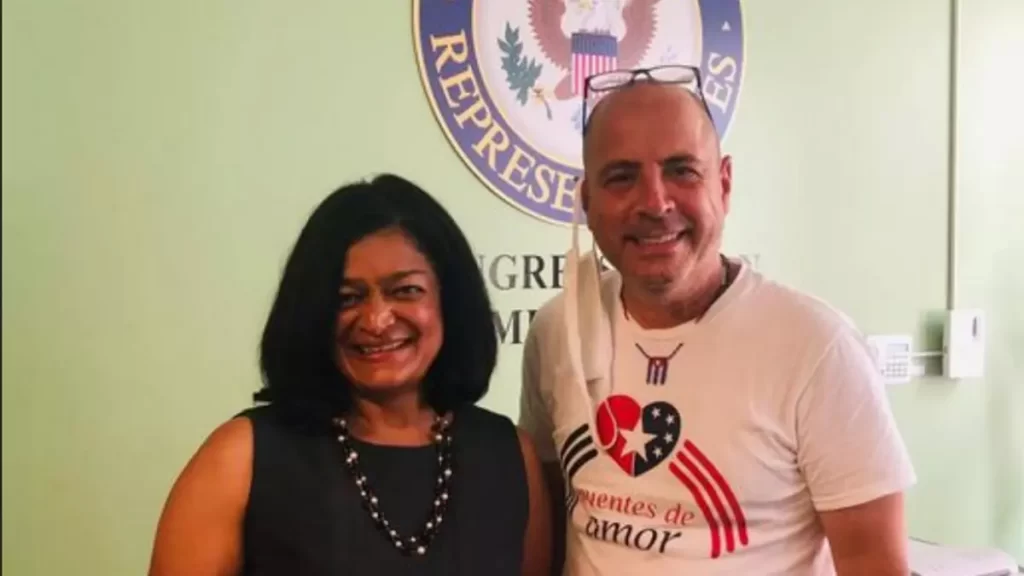
![]() 14ymedio, Madrid, February 28, 2024 — Two Democratic congresswomen, Pramila Jayapal and Ilhan Omar, led a delegation of members of the progressive caucus of the U.S. House of Representatives to Cuba last week, according to el Nuevo Herald. They were joined, according to sources in the Miami newspaper, by the congressional representative for California, Barbara Lee.
14ymedio, Madrid, February 28, 2024 — Two Democratic congresswomen, Pramila Jayapal and Ilhan Omar, led a delegation of members of the progressive caucus of the U.S. House of Representatives to Cuba last week, according to el Nuevo Herald. They were joined, according to sources in the Miami newspaper, by the congressional representative for California, Barbara Lee.
The information, which has not been disseminated in any Cuban media, was confirmed by the progressive caucus, which contains more than 100 legislators. Jayapal, from the state of Washington, is the president of the caucus.
“Representatives Jayapal and Omar traveled to Cuba last week, where they met with people from Cuban civil society and government officials to discuss human rights and the bilateral relationship between the U.S. and Cuba,” said a spokeswoman for the group.
“Representatives Jayapal and Omar traveled to Cuba last week, where they met with people from Cuban civil society and government officials”
The offices of the three congresswomen, for their part, refused to comment.
The trip took place on an unspecified date, but el Nuevo Herald places it at the beginning of last week, and the group was made up of a dozen people, although only the names of the two congresswomen were given. Both are critical of the U.S. embargo on Cuba.
Both Jayapal and Omar, a representative for Minnesota, have supported bills to normalize relations with the Government of Cuba. This January, Jayapal, on her X account, requested that Cuba be removed from the list of countries that sponsor terrorism. “Today marks three years since Cuba was included on the list, a Trump-era policy that has devastated the Cuban economy and made the life of its population more difficult. It’s time for Biden to eliminate that designation, lift sanctions and reopen relations with Cuba.”
“Being on this list has made it almost impossible for Cuba to do international business, which has caused an economic crisis that has led residents to flee the country,” she added.
In November 2021, the U.S. Congress approved a symbolic resolution in support of the 11J protesters and “the immediate release of arbitrarily detained Cuban citizens.” Likewise, the regime of Havana was urged to allow the march called for that month by the Archipelago collective. Previous repression ended up leading to the exile of its visible leader, the playwright Yunior García Aguilera.
That text was supported by 382 votes in favor and 40 against, among which were those of the two congresswomen. Although none expressly detailed at that time the reason for her vote against, the representative for Massachusetts, Jim McGovern, did so, arguing that the document did not recognize “the role played by the U.S. when it comes to contributing to the suffering of ordinary Cubans.”
In mid-January, there was a meeting between American and Cuban officials in Havana. The meeting was confirmed by the White House, which indicated that representatives of the Justice and National Security departments were going to participate in the Dialogue between the United States and Cuba on Law Enforcement. In that forum, they will address “topics of bilateral interest” and will seek “greater international cooperation in law enforcement,” a spokesman for the federal government previously said.
Jim McGovern, argued that the document did not recognize “the role played by the U.S. when it comes to contributing to the suffering of ordinary Cubans”
Just a week ago, the Deputy Undersecretary of Public Diplomacy, Politics, Planning and Coordination of the State Department also visited Havana. Kerri Hannan met with members of Cuban civil society, black activists, human rights defenders and independent private businessmen, as confirmed by the U.S. Embassy in Havana. The official also spoke with members of the Government of Cuba and, as she explained, “pressed for the release of the political prisoners.”
At the beginning of February, the Special Advisor of the State Department on International Rights of Persons with Disabilities, Sara Minkara, was on the Island. During her stay, she held meetings with “representatives of the Government of Cuba, independent Cuban businessmen, former students of programs sponsored by the Embassy and students of educational institutions in Havana,” said the diplomatic headquarters.
The meeting of the members of the progressive caucus, on the other hand, has not been disclosed by any of the parties, at least until the news was released, at which time they confirmed it. Neither the Cuban Government nor the official press, very active in reporting on this type of event, has pronounced itself.
On February 19, approximately the same date that el Nuevo Herald places the trip of the progressive caucus to Cuba, Miguel Díaz-Canel met in Havana with a delegation of American farmers, on their first visit to the Island, organized by the National Association of Departments of Agriculture of the United States. “If it were not for the blockade, we would have many mutual opportunities for work, to move forward for the benefit of both peoples,” said the president.
Translated by Regina Anavy
____________
COLLABORATE WITH OUR WORK: The 14ymedio team is committed to practicing serious journalism that reflects Cuba’s reality in all its depth. Thank you for joining us on this long journey. We invite you to continue supporting us by becoming a member of 14ymedio now. Together we can continue transforming journalism in Cuba.
